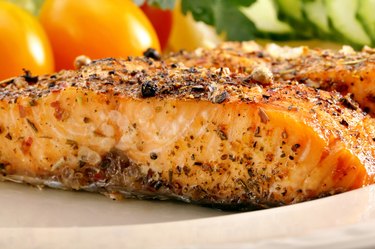
Coenzyme Q10 is a natural, vitamin-like substance your body makes. It's also obtained from your diet, and is commonly marketed as a supplement to aid weight loss. As with many weight loss products, there's little solid research to support the idea that CoQ10 aids weight loss. Currently, mainstream nutrition authorities do not recommend using CoQ10 as a weight loss supplement. There is evidence, however, it might offer other potential health benefits. Talk it over with your doctor before taking CoQ10 -- and remember, the best way to achieve and maintain a healthy weight is through changes in your diet and lifestyle habits that you can stick to long term.
Coenzyme Q10 and Weight Loss
Video of the Day
The primary role of CoQ10 is as an antioxidant. Your diet consists of antioxidants from a wide variety of sources, including fruits and vegetables. Antioxidants neutralize damaging particles known as free radicals to protect your cells from damage. The main source of dietary CoQ10 is from fatty fish such as mackerel, along with whole-grain foods.
Video of the Day
Your body also requires CoQ10 to produce energy from carbohydrates and fat in your diet. It acts as a coenzyme to adenosine triphosphate, a molecule your cells use as their main source of energy.
Because of its role in boosting cellular energy, CoQ10 is marketed for weight loss. No available human studies support this idea, however. In fact, a large study of weight loss supplements involving more than 15,000 middle-age participants found no benefit from taking CoQ10 for weight management. The study is reported in the October 2005 edition of the Journal of Alternative and Complementary Medicine.
Benefits for Blood Pressure
CoQ10 may help lower your blood pressure. Chronic high blood pressure, called hypertension, places stress on your circulatory system, including your heart, and contributes to cardiovascular disease.
A systematic review of eight studies found that supplementing CoQ10 lowered systolic blood pressure an average of 16 points and diastolic pressure an average of 10 points. Systolic refers to the amount of force against your artery walls when your heart beats, while diastolic is the pressure in your arteries between heart beats. The review was reported in the 2003 issue of the journal Biofactors.
Improves Blood Sugar Control
Glucose control plays a vital role in health. A healthy blood sugar level reduces the risk of heart disease and prevents damage to your organs. Regulating your blood sugar can also offer other benefits, such as preventing fatigue, hunger, headaches and thirst caused by rapidly fluctuating blood sugar levels. Supplementing CoQ10 may improve the way your body handles sugar, according to research conducted by the University of Western Australia. One paper, published in European Journal of Clinical Nutrition in 2002, reported that CoQ10 may improve long-term glucose control in participants with type 2 diabetes.
Coenzyme Q10 Precautions
Health doesn't come from a bottle, and taking a supplement without medical approval might cause side effects. Supplementing with CoQ10 appears to be safe, according to a report published in the journal Biofactors in 2008. However, it's still necessary to exercise precaution. CoQ10 may lower blood glucose, so get permission from your physician and enlist supervision if you plan on supplementing with it. Your health care provider may need to adjust your daily carbohydrate intake amount or medication accordingly. Taking CoQ10 may cause minor stomach upset, which may go away as your body adjusts to it. It may also interact with certain medications, such as blood thinning and blood-pressure lowering drugs.
- University of Maryland Medical Center: Coenzyme Q10
- Oregon State University: Coenzyme Q10
- Journal of Alternative and Complementary Medicine: Dietary Supplements and Weight Control in a Middle-Age Population
- Biofactors: Safety Assessment of Coenzyme Q10 (CoQ10)
- Biofactors: Systematic Review of Effect of Coenzyme Q10 in Physical Exercise, Hypertension and Heart Failure
- National Heart Lung and Blood Institute: Description of High Blood Pressure
- European Journal of Clinical Nutrition: Coenzyme Q10 Improves Blood Pressure and Glycaemic Control: a Controlled Trial in Subjects With Type 2 Diabetes